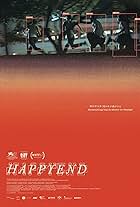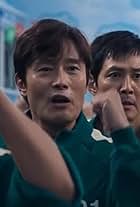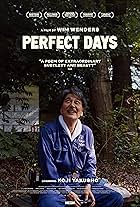
fundaquayman
Joined Jul 2004
Welcome to the new profile
We're still working on updating some profile features. To see the badges, ratings breakdowns, and polls for this profile, please go to the previous version.
Ratings4.3K
fundaquayman's rating
Reviews28
fundaquayman's rating
I count my blessings that work afforded me the opportunity to meet Ryuichi Sakamoto twice and watch two of his concerts when he toured across Asia for the release of the albums SWEET REVENGE, and 2 years later 1996.
Even though I sat face-to-face next to him in two different interviews, and watched him perform live, none of those encounters (nearly 3 decades ago) were able to make me feel the same sense of candid immediacy as this solo performance - OPUS has the ability to make the audience feel he played that piano and his music JUST FOR YOU. The film, to me, feels like it was made for both fans of Sakamoto, and people already familiar with his work and more importantly, his demeanor and the nuances to his way of play - the extreme close-ups, the cutaways to his reflection on the piano, hair, back, hands, his gestures and grimace as he plays, pause, and ponder, made to feel all the more alive by leaving in, or enhancing the vibe by integrating ambient sound in the studio into the space between each musical piece and as he performs - all of that help to place us - the audience, as if we were right there with him as he performed for that one last time... compared to all the past concert films and documentaries on Ryuichi Sakamoto, OPUS has neither a concert-hall filled with his diehard fans, nor does it delve into his almost-obsession of "Sound." Instead what the audience get is an experience of Sakamoto playing his music for you only.
Off stage, the Sakamoto I met was a quiet, observant, and slow to warm private man... until you hit a topic that interests him to unlock the guard he so comfortably is shielded by - from disliking the generic Jpop top acts of the time, to comparing 2 different Japanese authors both named Murakami (back in the 90's Sakamoto thought one was a hack, and the other "innovative, daring, and fresh" while admitting the dark topics Ryu Murakami wrote about were not to everyone's liking). Norika Sky Sora, his girlfriend at the time (whom he later married), was always nearby and the two would take cigarette breaks between interviews with their Gitanes... Sakamoto spoke about how the music industry in Japan was stuck with an old boys club arrangement, and if he had his way, music would not have to be distributed by means of just selling physical records or via the internet with the development of digital distribution technologies - there would no longer be boundaries due to geography or language differences... all that became a reality in the decade that followed, and I'm sure it made Sakamoto both happy and feel challenged at the same time. He spoke of his ambition and hope for music to have its own life, and his belief that "sounds" is both a part of, and as a proof of life itself - with OPUS, producer Norika Sora, and their son Neo, helped Ryuichi Sakamoto bid farewell without needing to say or treat this as a "Goodbye" - this sense of being in the Present, and not Past, is not what I expected as a takeaway from a concert film, even as a fan of Sakamoto's music. While some reviews here complain about the performance would have been more engaging if shown in color, in my opinion the choice of black/white allows the music itself to bring us our own unique interpretation to a spectrum of hues - as if this was his intention all along to ensure that not only his music, but also his vibe and presence, remain alive and a personal art form unique to each of us long after he's gone.
Even though I sat face-to-face next to him in two different interviews, and watched him perform live, none of those encounters (nearly 3 decades ago) were able to make me feel the same sense of candid immediacy as this solo performance - OPUS has the ability to make the audience feel he played that piano and his music JUST FOR YOU. The film, to me, feels like it was made for both fans of Sakamoto, and people already familiar with his work and more importantly, his demeanor and the nuances to his way of play - the extreme close-ups, the cutaways to his reflection on the piano, hair, back, hands, his gestures and grimace as he plays, pause, and ponder, made to feel all the more alive by leaving in, or enhancing the vibe by integrating ambient sound in the studio into the space between each musical piece and as he performs - all of that help to place us - the audience, as if we were right there with him as he performed for that one last time... compared to all the past concert films and documentaries on Ryuichi Sakamoto, OPUS has neither a concert-hall filled with his diehard fans, nor does it delve into his almost-obsession of "Sound." Instead what the audience get is an experience of Sakamoto playing his music for you only.
Off stage, the Sakamoto I met was a quiet, observant, and slow to warm private man... until you hit a topic that interests him to unlock the guard he so comfortably is shielded by - from disliking the generic Jpop top acts of the time, to comparing 2 different Japanese authors both named Murakami (back in the 90's Sakamoto thought one was a hack, and the other "innovative, daring, and fresh" while admitting the dark topics Ryu Murakami wrote about were not to everyone's liking). Norika Sky Sora, his girlfriend at the time (whom he later married), was always nearby and the two would take cigarette breaks between interviews with their Gitanes... Sakamoto spoke about how the music industry in Japan was stuck with an old boys club arrangement, and if he had his way, music would not have to be distributed by means of just selling physical records or via the internet with the development of digital distribution technologies - there would no longer be boundaries due to geography or language differences... all that became a reality in the decade that followed, and I'm sure it made Sakamoto both happy and feel challenged at the same time. He spoke of his ambition and hope for music to have its own life, and his belief that "sounds" is both a part of, and as a proof of life itself - with OPUS, producer Norika Sora, and their son Neo, helped Ryuichi Sakamoto bid farewell without needing to say or treat this as a "Goodbye" - this sense of being in the Present, and not Past, is not what I expected as a takeaway from a concert film, even as a fan of Sakamoto's music. While some reviews here complain about the performance would have been more engaging if shown in color, in my opinion the choice of black/white allows the music itself to bring us our own unique interpretation to a spectrum of hues - as if this was his intention all along to ensure that not only his music, but also his vibe and presence, remain alive and a personal art form unique to each of us long after he's gone.
If A GUILTY CONSCIENCE (2023) is the biggest box-office hit in HK cinema history, and likely the front-runner at next year's HKFA for Best Picture, then Time Still Turns The Pages (2023) is likely its strongest competition next spring and definitely the best HK film for the second half of 2023. The understated performance director turned actor Lo Chun-Yip brings to his role is the highlight of the film - along with Rosa Maria Velasco, one of the most under-utilized acting talents in HK cinema at the moment who is great both on stage and screen - these two manage to deliver captivating performances to the audience and be the glue that keep every scene they appear in solid, whether alone or as part of the ensemble. While singer-actor Ronald Cheng is supposed to be the main, top-bill headliner, but in every shot and every beat he acts with his fellow cast, he shows to be at least a couple of notches below them - especially in the crucial hospital scenes with Lo Chun-Yip and Rachael Leung (who was nominated for Best Supporting Actress at this year's Golden Horse Awards for her strong performance as a mentally-challenged teenager in the film IN BROAD DAYLIGHT, which is constantly being compared to TIME STILL TURNS THE PAGES due to both films' social commentary-driven stories).
There are a good number of Asian films from recent years that deal with bullying, domestic abuse, and their related dysfunctions (be it society, circumstances, or family), with Koreeda Hirokazu's KAIBATSU (2023) being one of the most notable examples of late. Director Nick Cheuk, who also wrote the screenplay, knocked it out of the park with his feature film debut, and TIME STILL TURNS THE PAGES (2023) is worthy of discussion in the topic of filmic depictions of bullying, dysfunctions in parenting and the education system, in the same class as KAIBATSU (2023). As a first-time feature-film director, he had a great ensemble cast (not forgetting the key child actors, and those who were cast to play the leads' teenage versions), and behind the camera he was flanked by a great crew, including Exec Producer Derek Yee (who is also the EP for IN BROAD DAYLIGHT, the other Indy-budget film driven by a Social Commentary premise), and Meteor Cheung as DP (Cheung also was DP to IN BROAD DAYLIGHT). This is the kind of story director Koreeda Hirokazu would have loved to be able to helm, and in spite of all the rants about HK's Film industry can no longer sustain without co-prod with north-bound cross-market appeal, these films (along with the recent indy documentary TO BE CONTINUED... (2023)) really help exemplify the fighting spirit of HK movies from past to present - Producer Derek Yee proudly exclaimed that while big budget films are getting harder to finance without co-prod and cross-market selling points integrated into the film/story, low budget films are where miracles can happen - the reason why he would produce a film with an inexperienced director is so the film can benefit from the passion and innocence of these talents who don't see the hard work as just work for next to nothing in pay, and they are willing to give everything they have to make sure their story is told well, as they may not get to do it again if it fails. Whether films made in HK for the Hong Kong audience can survive remains to be seen (yet this story will definitely resonate across markets beyond north of the border), as not every one of these passion-driven projects work, but the ones that work do give us hope, and that's the fighting spirit that helped to make the mark for HK films in the past and will continue to drive Hong Kong cinema forward.
There are a good number of Asian films from recent years that deal with bullying, domestic abuse, and their related dysfunctions (be it society, circumstances, or family), with Koreeda Hirokazu's KAIBATSU (2023) being one of the most notable examples of late. Director Nick Cheuk, who also wrote the screenplay, knocked it out of the park with his feature film debut, and TIME STILL TURNS THE PAGES (2023) is worthy of discussion in the topic of filmic depictions of bullying, dysfunctions in parenting and the education system, in the same class as KAIBATSU (2023). As a first-time feature-film director, he had a great ensemble cast (not forgetting the key child actors, and those who were cast to play the leads' teenage versions), and behind the camera he was flanked by a great crew, including Exec Producer Derek Yee (who is also the EP for IN BROAD DAYLIGHT, the other Indy-budget film driven by a Social Commentary premise), and Meteor Cheung as DP (Cheung also was DP to IN BROAD DAYLIGHT). This is the kind of story director Koreeda Hirokazu would have loved to be able to helm, and in spite of all the rants about HK's Film industry can no longer sustain without co-prod with north-bound cross-market appeal, these films (along with the recent indy documentary TO BE CONTINUED... (2023)) really help exemplify the fighting spirit of HK movies from past to present - Producer Derek Yee proudly exclaimed that while big budget films are getting harder to finance without co-prod and cross-market selling points integrated into the film/story, low budget films are where miracles can happen - the reason why he would produce a film with an inexperienced director is so the film can benefit from the passion and innocence of these talents who don't see the hard work as just work for next to nothing in pay, and they are willing to give everything they have to make sure their story is told well, as they may not get to do it again if it fails. Whether films made in HK for the Hong Kong audience can survive remains to be seen (yet this story will definitely resonate across markets beyond north of the border), as not every one of these passion-driven projects work, but the ones that work do give us hope, and that's the fighting spirit that helped to make the mark for HK films in the past and will continue to drive Hong Kong cinema forward.
























